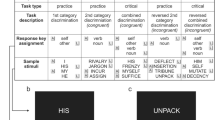Abstract
Recent studies about the implicit causality of inter-personal verbs showed a symmetric implicit consequentiality bias for psychological verbs. This symmetry is less clear for action verbs because the verbs assigning the implicit cause to the object argument (e.g. “Peter protected John because he was in danger.”) tend to assign the implicit consequence to the same argument (e.g. “Peter protected John so he was not hurt.”). We replicated this result by comparing continuations of inter-personal events followed by a causal connective “because” or a consequence connective “so”. Moreover, we found similar results when the consequence connective was replaced by a contrastive connective “but”. This result was confirmed in a second experiment where we measured the time required to imagine a consistent continuation for a fragment finishing with “but s/he ...”. The results were consistent with a contrastive connective introducing a denial of a consequence of the previous event. The results were consistent with a model suggesting that thematic roles and connectives can predict preferred co-reference relations.

Similar content being viewed by others
Notes
Because French first names cannot always be translated, the English translation will mention “Masc.” for a masculine first name and “Fem.” for a female first name.
References
Brown, R., & Fish, D. (1983). The psychological causality implicit in language. Cognition, 14, 237–273.
Chesnet, D., Guillabert, F., & Esperet, E. (1994). G-Studio: Un logiciel pour l’étude en temps réel des paramètres en temps réel de la production écrite. L’Année Psychologique, 94, 283–294.
Crinean, M., & Garnham, A. (2006). Implicit causality, implicit consequentiality and semantic roles. Language and Cognitive Processes, 21, 636–648.
Dowty, D. (1991). Thematic proto-roles and argument selection. Language, 67, 547–619.
Frege, G. (1994). On sense and reference. In R. Harnish (Ed.), Basic topics in the philosophy of language (pp. 142–160). Englewood Cliffs, NJ, Prentice-Hall (Original work published 1892).
Garvey, C., & Caramazza, A. (1974). Implicit causality in verbs. Linguistic Inquiry, 5, 469–464.
Grober, E. H., Beardsley, W., & Caramazza, A. (1978). Parallel function strategy in pronoun assignment. Cognition, 6, 117–133.
Guerry, M., Gimenes, M., Caplan, D., & Rigalleau, F. (2006). How long does it take to find a cause? An on-line investigation of implicit causality in sentence production. Quarterly Journal of Experimental Psychology, 59, 1535–1555.
Kehler, A. (2002). Coherence, reference, and the theory of grammar. Stanford, CA: CSLI Publications.
Lakoff, R. (1971). If’s, and’s, and but’s about conjunction. In C. J. Fillmore & D. T. Langendoen (Eds.), Studies in linguistic semantics (pp. 114–149). New York: Reinhart and Winston.
Levin, B., & Rappaport Hovav, M. (2005). Argument realization. Cambridge: Cambridge University Press.
McKoon, G., Greene, S. B., & Ratcliff, R. (1993). Discourse models, pronoun resolution, and the implicit causality of verbs. Journal of Experimental Psychology: Learning, Memory, and Cognition, 19, 1040–1052.
Pickering, M. J., & Majid, A. (2007). What are implicit causality and consequentiality? Language and Cognitive Processes, 22, 780–788.
Rudolph, U., & Försteling, F. (1997). The psychological causality implicit in verbs: A review. Psychological Bulletin, 121, 192–218.
Stevenson, R. J., Crawley, R. A., & Kleinman, D. (1994). Thematic roles, focus and the representation of events. Language and Cognitive Processes, 9, 519–548.
Stewart, A. J., Pickering, M. J., & Sanford, A. J. (1998). Implicit consequentiality. In Proceedings of the twentieth annual conference of the cognitive science society (pp. 1031–1036). Mawah, NJ: Lawrence Erlbaum.
Author information
Authors and Affiliations
Corresponding author
Appendix
Rights and permissions
About this article
Cite this article
Rigalleau, F., Guerry, M. & Granjon, L. The Effect of Connectives on the Selection of Arguments: Implicit Consequentiality Bias for the Connective “but”. J Psycholinguist Res 43, 465–485 (2014). https://doi.org/10.1007/s10936-013-9265-3
Published:
Issue Date:
DOI: https://doi.org/10.1007/s10936-013-9265-3




